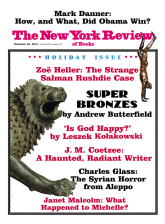In response to:
A Very Sad Freud from the December 6, 2012 issue
To the Editors:
Joyce Carol Oates’s review of my novel Freud’s Sister [NYR, December 6] contains several points that demand a reply.
Despite Ms. Oates’s claim that “like the fine mist of poison gas that hisses into the Nazi death chamber at Terezín at the terrifying conclusion of Freud’s Sister,” both in the novel and in reality, there were no gas chambers in Terezín. This is clear from what Ottla Kafka tells Adolfina, and from the narration of the train transfer from Terezín to the other camp, where the gas chambers are.
Stating that in my novel Sigmund Freud’s “identification with German culture is predominant, and his sense of himself as Jewish secondary,” Ms. Oates names several authors (including Peter Gay) with “differing views of the subject of Freud’s Jewishness.” It is Peter Gay who in his book Freud, Jews, and Other Germans (Oxford University Press, 1978), in the chapter titled “Sigmund Freud: A German and His Discontents,” identifies Freud as “a most indifferent Jew.”
Of greater concern, however, is Ms. Oates’s misunderstanding of Adolfina’s character. She writes: “At other times Adolfina is scarcely articulate, and exasperatingly passive, to a degree that suggests mental retardation.” First of all, not all people with mental retardation are passive (and, for Joyce Carol Oates, they are “exasperatingly passive”). Second, not all the people that are “scarcely articulate” and “passive” have mental retardation. These symptoms are found in many mental and psychological conditions, including despair.
But even in periods when they seem passive to others, people who suffer from despair have an active inner life, consisting of the struggle for the meaning of existence. That is the core of Freud’s Sister: between the moments of birth and death, the novel narrates a life full of love and hatred, tenderness and cruelty, melancholia and madness. It is a life of struggle to find the meaning of one’s existence, a novel about finding the meaning of the life.
Goce Smilevski
Skopje, Macedonia
Joyce Carol Oates replies:
Freud’s Sister is a challenging novel to read, as it must have been enormously challenging to write. The claustrophobic nature of the narrative, the fairy-tale simplicity of the characters, the reader’s uneasy sense that the historical Sigmund Freud is being exploited in a highly impressionable, prejudicial agenda in which the founder of psychoanalysis is both the primary resource and the villain—all combine to create a unique work of art, as I’d tried to convey in my review, that many readers may find mesmerizing and some will find highly controversial. And I should add, in correction to my footnote in the review, that Freud’s daughter Anna, presented so reductively in Freud’s Sister, might more accurately be said to have “established the field of child psychoanalysis” and to have “helped establish the field of child psychology.”



